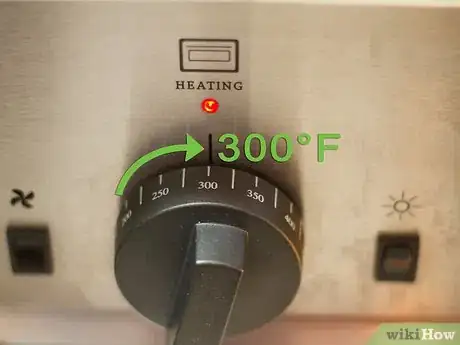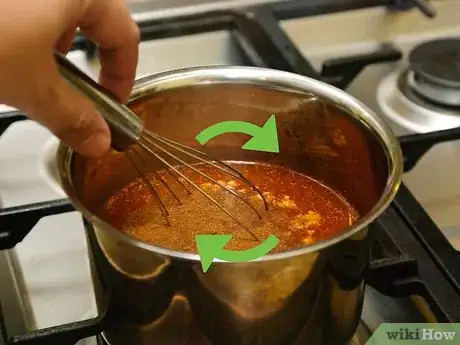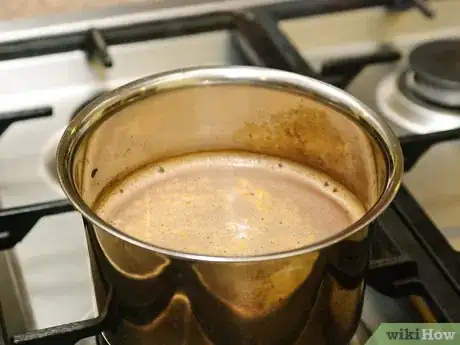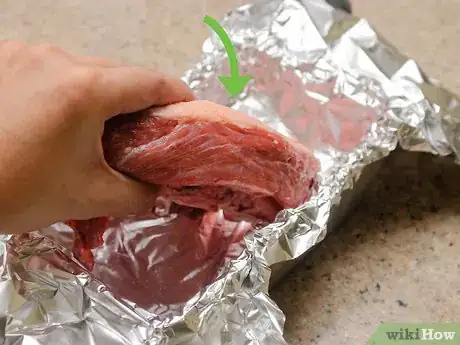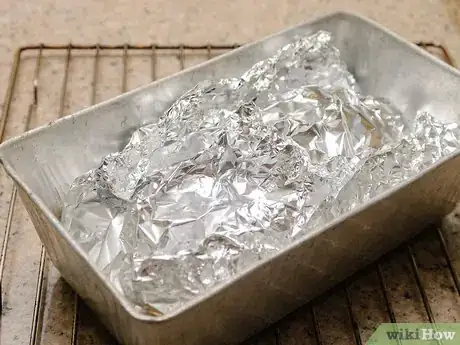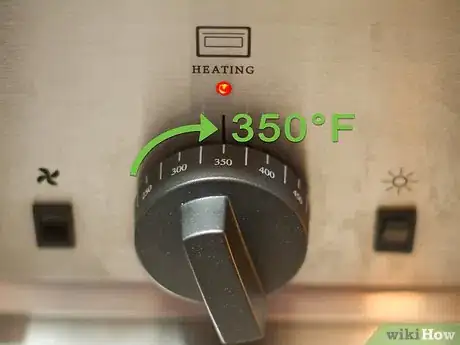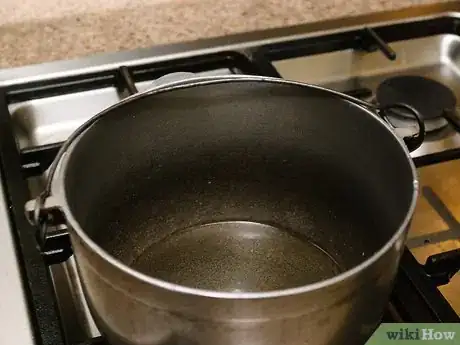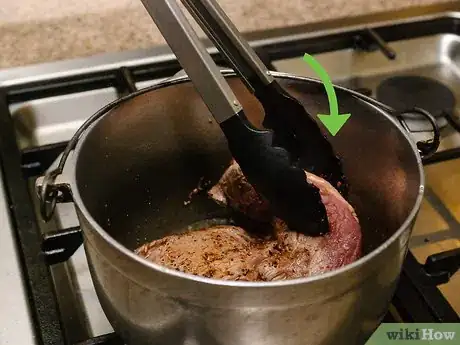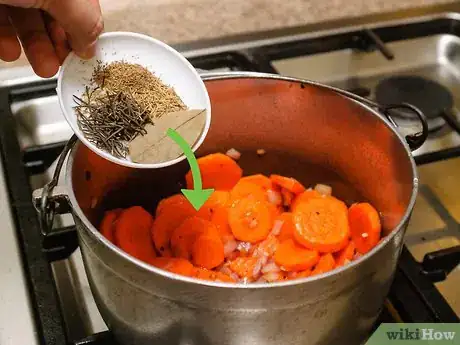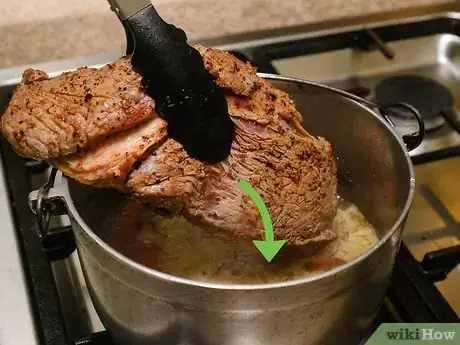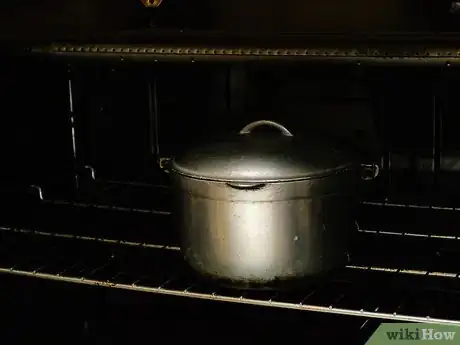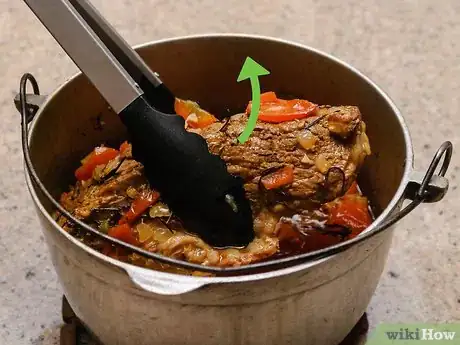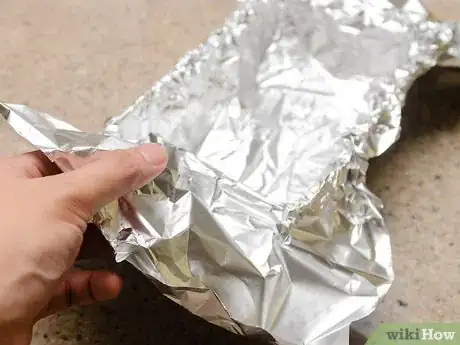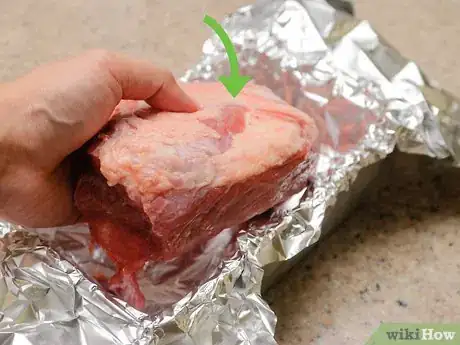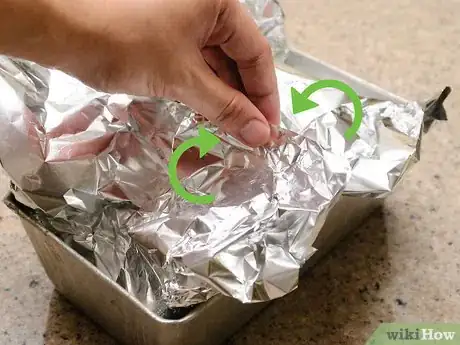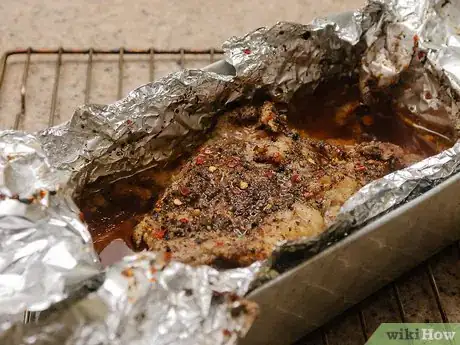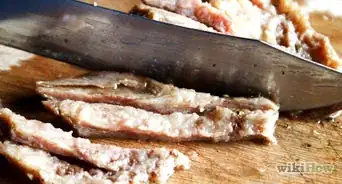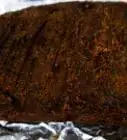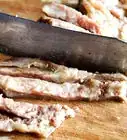wikiHow is a “wiki,” similar to Wikipedia, which means that many of our articles are co-written by multiple authors. To create this article, volunteer authors worked to edit and improve it over time.
wikiHow marks an article as reader-approved once it receives enough positive feedback. In this case, 91% of readers who voted found the article helpful, earning it our reader-approved status.
This article has been viewed 364,415 times.
Learn more...
Brisket is a tough cut of meat, so it is often slow cooked to make it tenderer and more flavorful. Beef briskets are the most common type, but if you want something with an even more delicate flavor and greater tenderness, try veal brisket. There are also corned beef briskets that come packaged with a special pickling spice they need to be cooked with. To learn more about cooking each type of brisket in the oven, keep reading.
Ingredients
Makes 8 servings
- 3 to 4 lb (1350 to 1800 g) beef brisket, fat trimmed off
- 1/2 cup (125 ml) ketchup
- 1/4 cup (60 ml) apple cider vinegar
- 1/4 cup (60 ml) brown sugar
- 2 Tbsp (30 ml) soy sauce
- 1 Tbsp (15 ml) Worcestershire sauce
- 1 Tbsp (15 ml) prepared yellow mustard
- 1/2 tsp (2.5 ml) ground ginger
- 1/2 tsp (2.5 ml) garlic powder
- 2 tsp (10 ml) canola oil
- 1/2 cup (125 ml) water
Makes 6 servings
- 3 lb (1350 g) veal brisket
- 1 tsp (5 ml) salt
- 1 tsp (5 ml) ground black pepper
- 1 Tbsp (15 ml) vegetable oil
- 2 medium onions, chopped
- 4 large carrots, sliced into coins
- 2 garlic cloves, minced
- 1 bay leaf
- 2 tsp (10 ml) dry thyme
- 2 tsp (10 ml) dry rosemary
- 3 Tbsp (45 ml) fresh chopped parsley
- 2 cups (500 ml) dry white wine
- 2 cups (500 ml) crushed tomatoes
Makes 6 to 8 servings
- 3 to 4 lb (1350 to 1800 g) beef brisket with seasoning packet
- 1 to 2 cups (250 to 500 ml) water or beef broth
Steps
Beef Brisket
-
1Preheat the oven to 300 degrees Fahrenheit (150 degrees Celsius). Prepare a roasting pan by lining it with a large sheet of aluminum foil.
- The foil needs to be at least three times as large as the bottom of your roasting pan. You will need enough foil to wrap completely and securely around the brisket, so if necessary, you can test the amount by wrapping it around your brisket before you use it the line the pan.
-
2Combine the sauce ingredients. In a small saucepan, whisk together the ketchup, vinegar, brown sugar, soy sauce, Worcestershire sauce, mustard, ginger, garlic, oil, and water until combined.
- Alternatively, you could use your favorite prepared barbecue sauce instead of this sauce recipe. Use roughly 3/4 cup (185 ml) of prepared sauce and mix it with 1 cup (250 ml) of water. No simmering is necessary if using prepared sauce.
Advertisement -
3Simmer the sauce for 5 minutes. Heat the sauce on your stove over medium-high heat until it reaches a simmer. Let cook for 5 minutes, stirring occasionally, so the flavors blend.
- Pre-heating the barbecue sauce separately allows the flavors of the sauce to blend more thoroughly before you add it to the beef brisket. If you do not pre-cook the sauce, you may end with a brisket that is unevenly flavored, with some tastes being stronger on one side of the meat than they are on another.
-
4Transfer the brisket and sauce to the roasting pan. Place the beef brisket on the aluminum foil and spread the sauce over it, covering as much of the meat as possible. Wrap the foil around the brisket when done.
- By wrapping the brisket, you seal the liquid in and keep that liquid in full contact with the meat. This leads to a more even, more rapid, and more flavorful cooking process.
- Make sure the foil is wrapped around the brisket tightly so no liquid can leak out through the corners of the foil packet.
-
5Bake until tender. The beef brisket should be roasted for roughly 1 hour per l lb (450 g) of meat. In this case, the brisket should cook for 3 to 4 hours.[1]
- Do not unwrap the brisket during the cooking process unless you are checking for doneness. Unwrapping the meat can cause some liquid to be lost, which can upset the cooking time and lead to a brisket that is drier than ideal.
- You should also watch the brisket to make sure that liquid is not leaking out from the corners of the foil. If liquid does seep out, carefully refold the corners of the foil down using oven mitts to prevent additional liquid loss.
- Check the internal temperature of the brisket with a meat thermometer. The temperature should be between 190 and 200 degrees Fahrenheit (88 to 93 degrees Celsius) when safe and tender enough to eat, and the meat should be easy to pull apart.[2]
-
6Let rest before serving. Remove the beef brisket from the oven and let it rest for 30 minutes before you carve and serve it.
- Slice the brisket across the grain to produce more tender slices of beef.
- You can also serve the brisket with its cooking juices for a more intense flavor. Skin the fat from the surface of the cooking liquid using a spoon before ladling the liquid over carved slices of meat.
Veal Brisket
-
1Preheat the oven to 350 degrees Fahrenheit (180 degrees Celsius). Meanwhile, season the veal brisket with salt and pepper on all sides.
-
2Heat oil in a large Dutch oven. Add the oil to an oven-safe Dutch oven and heat over medium-high for a couple of minutes, letting it become thinner and easier to spread across the bottom of the Dutch oven.
- Veal brisket is usually browned while beef brisket is often prepared without being browned. The flavor of veal is improved more dramatically on browning than the flavor of beef, at least as far as oven-cooked brisket is concerned.
-
3Sear the brisket on all sides. Add the veal brisket to the hot oil and sear on each side, turning with tongs as needed, until all sides are lightly browned. This should take about 3 to 5 minutes per side.
- When done, remove the brisket from the Dutch oven and keep warm.
-
4Briefly cook the onions, carrots, and garlic. Add these ingredients to the remaining oil in the Dutch oil and cook, stirring frequently, until the onions begin to wilt and turn golden and translucent. This should take another 4 minutes or so.
- If there is little to no oil left in the Dutch oven when you add the vegetables, add another splash of oil so these ingredients can be sautéed in fat.
-
5Add the seasonings and white wine. Add the bay leaf, thyme, rosemary, parsley, and white wine to the Dutch oven. Simmer over medium-high heat for 2 to 3 minutes.
- Stir the bottom of the Dutch oven, scraping up any stuck bits of veal or vegetables in the process. These small bits are packed with flavor, so you do not want to lose them.
- If you want to remove the herbs before serving the veal brisket, place them inside a small satchel made of cheesecloth. This is not strictly necessary, though, since the bay leaf is the only one that really needs to be removed and it is usually easy enough to spot and remove on its own.
-
6Return the brisket to the Dutch oven with the tomatoes. Return the veal brisket to the Dutch oven and add the crushed tomatoes. Cover the pot.
- Use the lid to your Dutch oven. If it does not have a lid, cover tightly with aluminum foil.
-
7Roast until tender. This should take about 2 1/2 to 3 hours.[3] Keep the Dutch oven covered for the duration of the cooking process, only removing the lid to check for doneness.
- Check the internal temperature of the brisket with a meat thermometer. The temperature should be between 190 and 200 degrees Fahrenheit (88 to 93 degrees Celsius) when safe and tender enough to eat, and the meat should be easy to pull apart.
-
8Let rest before serving. Remove the veal brisket from the oven and let it rest for 20 minutes before carving and serving it.
- Slice the brisket across the grain to produce more tender slices of veal.
- You can also serve the brisket with its cooking juices for a more intense flavor. Skin the fat from the surface of the cooking liquid using a spoon before ladling the liquid over carved slices of meat.
Corned Beef Brisket
-
1Preheat the oven to 200 degrees Fahrenheit (90 degrees Celsius). Prepare a roasting pan by lining it with a large sheet of aluminum foil.
- The foil needs to be at least three times as large as the bottom of your roasting pan. You will need enough foil to wrap completely and securely around the brisket, so if necessary, you can test the amount by wrapping it around your brisket before you use it the line the pan.
-
2Place the brisket in your roasting pan. Sit the beef brisket directly in the center of the foil lining your roasting pan.
- Do not open the seasoning packet yet. This packet will be used a little later in the process.
-
3Add water to the pan. Pour enough water into the roasting pan to reach the top edge of the brisket.
- You only need enough water to help braise the meat. It does not need to cover the brisket completely.
-
4Sprinkle the seasoning packet onto the meat. Distribute the seasoning packet over the top surface of the brisket and into the surrounding water.
- By getting some seasoning packet into the water and on top of the beef brisket itself, you can distribute the flavor more evenly throughout the cut of meat. Otherwise, the majority of the flavor would be concentrated on the top of the brisket alone.
-
5Wrap the brisket. Tightly wrap the aluminum foil around the brisket, creating a seal so none of the liquid can escape as the corned beef brisket cooks.
- By wrapping the brisket, you seal the liquid in and keep that liquid in full contact with the meat. This leads to a more even, more rapid, and more flavorful cooking process.
-
6Cook until tender.[4] This can take anywhere from 3 to 6 hours. After the 3-hour mark, check the brisket every 30 to 40 minutes to check its internal temperature and tenderness.
- Do not unwrap the brisket during the cooking process unless you are checking for doneness. Unwrapping the meat can cause some liquid to be lost, which can upset the cooking time and lead to a brisket that is drier than ideal.
- You should also watch the brisket to make sure that liquid is not leaking out from the corners of the foil. If liquid does seep out, carefully refold the corners of the foil down using oven mitts to prevent additional liquid loss.
- Check the internal temperature of the brisket with a meat thermometer. The temperature should be between 190 and 200 degrees Fahrenheit (88 to 93 degrees Celsius) when safe and tender enough to eat, and the meat should be easy to pull apart.
-
7Let rest before serving. Remove the corned beef brisket from the oven and let rest 20 to 30 minutes before carving and serving it.
- Slice the brisket across the grain to produce more tender slices of corned beef.
- You can also serve the brisket with its cooking juices for a more intense flavor. Skin the fat from the surface of the cooking liquid using a spoon before ladling the liquid over carved slices of meat.
-
8Finished.
Community Q&A
-
QuestionHow do I make a seasoning packet for a beef brisket?
 Community AnswerIt's mostly by preference. I'd recommend going heavy on salt and pepper then adding, mustard powder (this goes a long way), equal parts chili powder, paprika, cumin, and then some light brown sugar.
Community AnswerIt's mostly by preference. I'd recommend going heavy on salt and pepper then adding, mustard powder (this goes a long way), equal parts chili powder, paprika, cumin, and then some light brown sugar. -
QuestionCan liquid smoke be used to marinate brisket?
 Community AnswerYes, but you have to use it very sparingly. Liquid smoke is very concentrated. A little tiny amount goes a long way.
Community AnswerYes, but you have to use it very sparingly. Liquid smoke is very concentrated. A little tiny amount goes a long way. -
QuestionCan I slow cook the beef brisket on top of the stove?
 Community AnswerYes, you can.
Community AnswerYes, you can.
Things You'll Need
- Roasting pan or Dutch oven
- Aluminum foil
- Saucepan
- Whisk
- Meat thermometer
- Tongs
- Carving utensils
- Serving platter
References
About This Article
To cook a beef brisket in the oven, start by whisking together the sauce ingredients in a small saucepan and letting it simmer for 5 minutes. Alternatively, heat ¾ cup of prepared barbecue sauce with 1 cup of water. Next, place a sheet of aluminum foil over the roasting pan, put the brisket on top, and pour the sauce evenly over the meat. Then, wrap the foil tightly around the brisket to seal in the liquid and help it cook more evenly. Finally, bake the brisket for 1 hour per pound in a 300 degree F oven. To learn more, including how to cook a veal or corned beef brisket in the oven, scroll down.
